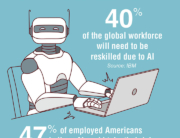Developments from the Staffing Industry Daily News and The Staffing Stream to help you focus on emerging movements that could shape your business for the better.
Canadian firms expect to increase use of variable workforce.
Nontraditional workers (contract, consultant, remote or freelance workers) comprise 20% to 30% of Canada’s workforce, a statistic that is expected to increase in the next decade, according to the new Workforce 2025 report released by Randstad Canada. Almost half of organizations reported currently being committed to building a variable workforce over the next five years to allow for greater flexibility and adaptability, the report found.
Despite political climate, companies look to hire immigrants.
In the midst of ongoing debate around immigration, US employers plan to reach beyond borders to help fill US jobs, according to a CareerBuilder survey. Thirty-three percent of employers said they plan to hire immigrant workers in 2017, with 16% planning to do so in the second quarter.
Rethinking Rewards
CEOs opt for longer-term incentives, Korn Ferry finds.
Boards turned to forward-looking CEO compensation vehicles instead of more immediate salary and bonus increases to reward the top leaders at the highest revenue companies in the US, according to a recent Korn Ferry Hay Group CEO Compensation Study.
CEO bonuses and salaries plus bonuses rose only slightly in 2016 (up 1.1% and 1.4%, respectively). On the other hand, performance equity and stock awards rose dramatically:
- Stock awards rose 5.5%
- Total long-term incentives rose 7.0%
- Total direct compensation (TDC) rose 6.1%
Staffing firms face growing threat of data theft.
Today’s hackers have become so sophisticated that they can overcome even the best network security measures. Hackers also have figured out that staffing firms, which typically store thousands of Social Security and driver’s license numbers in their databases, make for enticing targets. Unfortunately, the insurance policies written to cover cyberattacks are anything but simple. That said, there are three areas of coverage at the heart of cyber insurance:
- Liability. This pays for the defense and settlement costs arising out of a company’s failure to properly care for private data.
- Crisis management. This addresses the response costs following a data breach, including investigation, public relations, customer notification and credit monitoring.
- Regulatory fines and penalties. We’re talking about the costs to investigate, defend, and settle fines and penalties that may be assessed by a regulator. Be careful here, however, because many carriers do not provide this coverage, although there can be coverage for defense costs.
Source: “Staffing firms face growing threat of data theft,” The Staffing Stream, by Jake Best, an insurance advisor at CCIG
Be Prepared
Getting ready for Brexit with new talent borders.
Last June, the United Kingdom voted to withdraw from the European Union — also known as Brexit.
The UK started the withdrawal process in March, putting the UK on course to leave the EU by April 2019. Organizations must create plans over the next two years to guide them in making informed, strategic decisions about how they recruit and retain talent in the UK as access to workers with specific skills is affected. Some steps to take now:
- Map Talent. Determine the demographics of your workforce.
- Analyze. Understand the skills that you have in place today, what you may lose, and what you may need in the future.
- Assess Programs and Training. Hiring procedures, training and educational programs will be important to develop adequate resources for filling any skills or talent gaps resulting from Brexit.
- Commit to Recruiting. Remain committed to investing in recruitment and retention, including recruiting talent that may have left the UK for opportunities in other countries.
- Invest in Technology. From analysis and program management to talent sourcing and fulfillment, managing an efficient and evolving workforce is critical.
Source: “Preparing for Brexit With New Talent Borders,” The Staffing Stream, by Gary Jones, SVP, business solutions, EMEA, ZeroChaos












